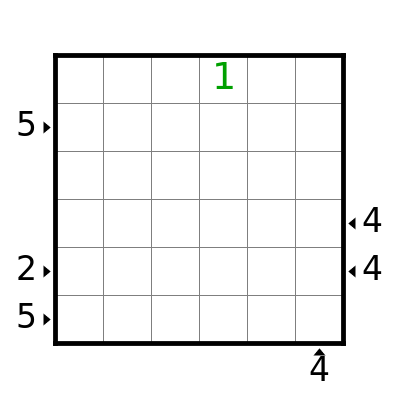I've been of the opinion that in genres where clues and givens differ, constructors are tempted to avoid the latter. I understand how the restriction, much like symmetries, allow the setter to enjoy himself and play with the rules, and then share a beautiful by-product of his fun with others. But it has been my experience that, in making this an expectation for handmade puzzles, both authors and solvers often suffer: ideas are compromised, brute force and bifurcation enters the picture, and completing the grid becomes unfun and laborious.
I further claim that one of the genres that suffers the most from this is Skyscrapers, where often eliminating one problematic possibility inserts multiple new clues, which then undermine the existing logic chain. This is all a very long-winded to say that I don't care for my street cred enough not to post a neat, easy Skyscrapers puzzle. I do find it telling of the attitude that the otherwise excellent pzv doesn't even consider allowing me to offer solvers a given. Thus, if you use the solver linked through the image, you're going to have to carry the 1.
Skyscraper rules
Place one number between one and the side length of the grid in each empty cell. Numbers in the same row, or the same column, should differ. Clues outside the grid indicate how many cell numbers are larger than any preceding cell number.
Alternative, equivalent rule description.
Remember to carry the given 1 through to the automated solver offered by clicking the image.
I further claim that one of the genres that suffers the most from this is Skyscrapers, where often eliminating one problematic possibility inserts multiple new clues, which then undermine the existing logic chain. This is all a very long-winded to say that I don't care for my street cred enough not to post a neat, easy Skyscrapers puzzle. I do find it telling of the attitude that the otherwise excellent pzv doesn't even consider allowing me to offer solvers a given. Thus, if you use the solver linked through the image, you're going to have to carry the 1.
Skyscraper rules
Place one number between one and the side length of the grid in each empty cell. Numbers in the same row, or the same column, should differ. Clues outside the grid indicate how many cell numbers are larger than any preceding cell number.
Alternative, equivalent rule description.
Remember to carry the given 1 through to the automated solver offered by clicking the image.

1 comments:
Your rule description is not as exact as the original, because the word "any" is ambiguous (conyider the phrase "x can be any number between 1 and 9"). In a rule description there should not be any room for ambiguity.
Post a Comment